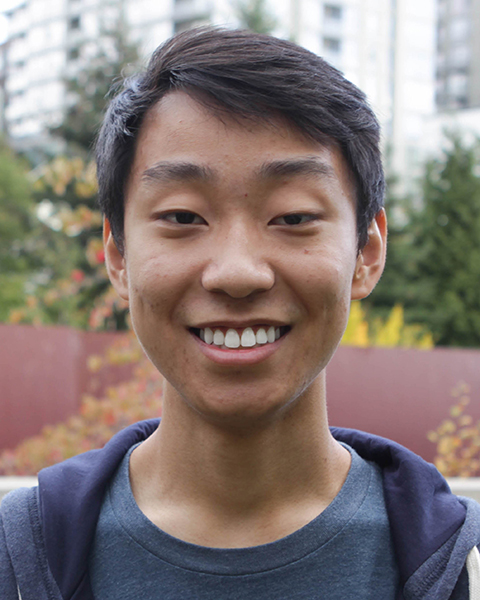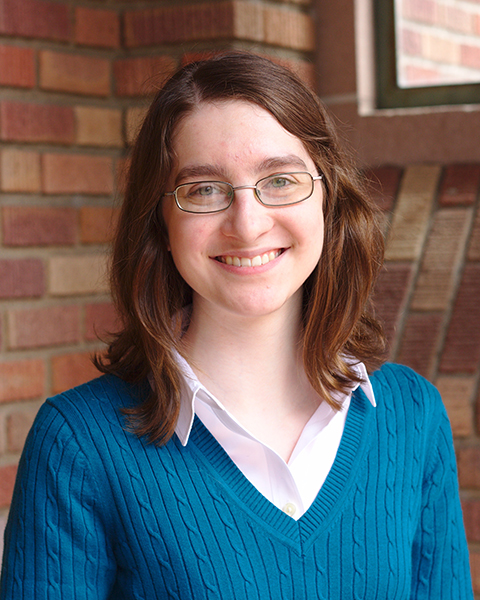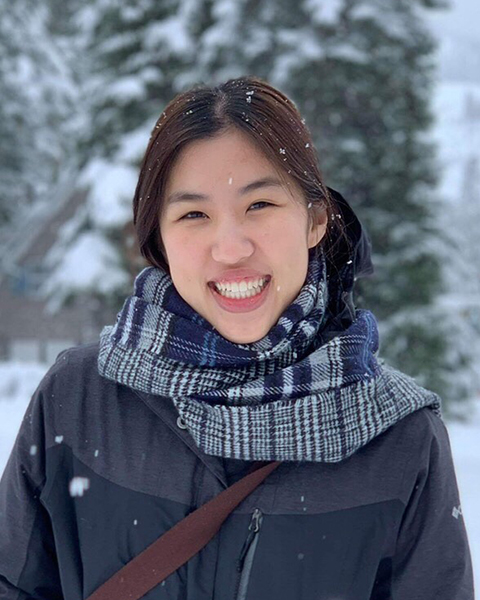Each year, the Computing Research Association (CRA) recognizes rising young research talent at colleges and universities across North America through its Outstanding Undergraduate Researcher Awards. As part of its 2019 competition, the CRA honored four Allen School undergraduates — Nelson Liu, Kimberly Ruth, Pathirat Kosakanchit, and Rowan Phipps — for their contributions in natural language processing, security and privacy, and technology for development and for demonstrating the potential to have an even greater impact in their future careers.
Nelson Liu is one of two Allen School students who were named finalists in this year’s CRA awards. Liu is a senior majoring in Computer Science and Linguistics whose research focuses on machine learning and natural language processing (NLP). Working under the guidance of Allen School professor Noah Smith, Liu has explored the linguistic capabilities and limitations of recurrent neural networks (RNNs), which form the backbone of state-of-the-art NLP systems. His work breaks into the “black box” of neural network NLP models to advance our understanding of their inner workings and abilities, a step toward his broader goals of improving the generalizability and interpretability of such models.
For one project, Liu and his collaborators at the Allen Institute for Artificial Intelligence (AI2) and University of Colorado Boulder found that long short-term memory recurrent neural networks (LSTMs) trained on natural language data outperform those trained on non-language sequential data in solving memorization tasks, demonstrating that recurrent neural networks exploit the linguistic attributes of data even while performing inherently non-linguistic tasks. The results earned Liu and his team a Best Paper award at the Association for Computational Linguistics’ 2018 Workshop on Representation Learning for NLP (RepL4NLP 2018). Liu’s recent work has also examined the linguistic knowledge implicitly encoded within contextualized word vectors by assessing their ability to predict a broad range of linguistic features of input text, and investigated the ability of NLP models to adapt to adversarial datasets in order to gauge their effectiveness in evaluating model generalization. Papers about both of these projects were recently accepted for presentation at the upcoming annual conference of the North American chapter of the ACL (NAACL 2019).
Liu previously earned a prestigious Goldwater Scholarship, which recognizes undergraduates who intend to pursue a research career in the natural sciences, mathematics, or engineering, and Washington Research Foundation Fellowships in 2017-18 and 2018-19 as part of a program supporting undergraduates who engage in sophisticated research projects that involve creativity and advanced subject knowledge.
Kimberly Ruth was named a finalist in the 2019 CRA competition based on her work aimed at improving the security and privacy of augmented reality applications. Ruth, a senior in the Interdisciplinary Honors Program pursuing a double-major in Computer Engineering and Mathematics, has been working with Allen School professors Tadayoshi Kohno and Franziska Roesner in the Security and Privacy Research Laboratory since her freshman year.
Ruth’s first foray into AR security focused on addressing the safety and security risks of unregulated application output, such as content that interferes with their ability to view important real-world information or distracts users from critical tasks such as driving. The research team developed, prototyped and evaluated Arya, an AR platform that enables developers to specify security policies that will prevent malicious or buggy output. Working with Arya collaborator Kiron Lebeck, a Ph.D. student in the Allen School, Ruth then turned her attention to multi-user scenarios such as AR-enabled collaborative tools and multi-player games. The team designed and conducted a user study to better understand the the privacy and security challenges of these increasingly popular applications using the Microsoft HoloLens platform. Based on her experience with both projects, Ruth became interested in how technical design solutions can be used to help developers build multi-user AR apps that protect against user-level threats. To that end, she developed a set of design principles and prototype for a multi-user AR module that would enable users to control access to sensitive information, filter inappropriate content, and engage in both co-located and remote content sharing.
Ruth was previously recognized with a 2018 Goldwater Scholarship, a Mary Gates Research Scholarship, and Washington Research Foundation Fellowships in 2017-18 and 2018-19. Last year, she was named a member of the Husky 100, which celebrates the contributions of University of Washington students who are making the most of their Husky experience. Ruth was also selected as a finalist in the CRA’s 2018 Outstanding Undergraduate Researcher competition.
Pathirat “Pat” Kosakanchit, a junior majoring in Computer Engineering, earned an honorable mention from CRA for her research as a member of the Allen School’s Information and Communication Technology for Development (ICTD) Lab. Spurred by the internet’s ability to advance social, educational, and economic opportunity, Kosakanchit has spent the past year working on the Community LTE (CoLTE) project under the guidance of professor Kurtis Heimerl and postdoc Spencer Sevilla.
CoLTE is an open-source LTE software package that enables rural communities lacking retail internet access to establish and maintain their own network. Kosakanchit’s technical contributions to the project include testing and debugging the network stack, and building a Node.js application that enables users to check their data usage, top up their account, and transfer credit to fellow users. In recognition of the unique challenges of remote communities in a network outage, she also built an offline, locally-hosted version of OpenStreetMap (OSM) that provides residents with access to basic mapping services when they are unable to access the internet. To implement the offline version, Kosakanchit had to overcome several configuration issues relating to virtual machine and database setup. She also designed and implemented a set of map markers signaling fire, water, food, and medicine that users could pin to the offline version of OSM during emergencies. The team has launched a pilot CoLTE network in two locations: the small Indonesian village of Bokondini and the town of Santa Inés in Oaxaca, Mexico. Additional networks are planned to be deployed in Washington state, Argentina, and potentially in Kosakanchit’s native Thailand.
Kosakanchit has applied her mapping skills outside of the ICTD Lab as a member of WOOF3D, the UW’s 3D-printing club, where she contributed to the development of a simplified process for 3D printing topological maps. Kosakanchit also serves as a mentor for the International Student Mentorship Program, which helps international students adjust to life in the United States, and is an active member of the Thai Student Association at UW.
Rowan Phipps, a senior majoring in Computer Science who also works with Heimerl in the ICTD Lab, received an honorable mention for his work on mobile security as part of the Digital Financial Services Research Group, a collaboration between members of the ICTD Lab and Security and Privacy Research Lab. Phipps’ research focuses on the security implications of devices and services used for mobile banking in communities where people lack access to traditional financial services.
Phipps and his colleagues were particularly interested in the growing use of ThinSIMs, which are small, programmable add-ons to a mobile SIM card that make it easier to deploy additional applications. Many mobile banking services are Slim Toolkit (STK) applications, which run directly on a SIM card. STK apps adhere to the GSM standard and are compatible with every mobile phone, but they require installation by the SIM card manufacturer. New market entrants can use ThinSIMS to get around this hurdle and provide alternatives to the services offered by incumbent providers. The disadvantage to ThinSIMs, as Phipps and his colleagues discovered, is that they can be used to intercept and initiate communications over the SIM interface without the user’s knowledge or consent, redirecting their credentials, their calls — and potentially their money — to an attacker. The team discovered a similar vulnerability with another popular protocol for delivering mobile money services, known as unstructured supplementary service data or USSD, when paired with a ThinSIM. In a paper that appeared at the Association for Computing Machinery’s 1st annual Conference on Computing & Sustainable Societies (COMPASS 2018), the team revealed the vulnerabilities associated with ThinSIMs using attacks Phipps designed to exploit mPesa, a popular STK-based app, as well as a USSD-based service he created for the experiment. Phipps and his collaborators also recommended modifications to existing apps and the GSM standard to protect users against such attacks.
Phipps was a member of the UW student team that captured first place in last year’s Pacific Rim Collegiate Cyber Defense Competition. He previously completed a technical internship at Qumulo and, before that, spent a summer as a teaching assistant for Girls Who Code.
Learn more about the CRA Outstanding Undergraduate Researcher Awards here.
Congratulations to Nelson, Kimberly, Pat, and Rowan!






